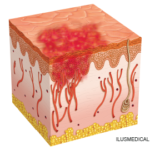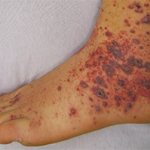 EULAR 2024 (VIENNA)—How should we treat immunoglobulin A (IgA) vasculitis and IgA nephropathy? For patients requiring immunosuppression, glucocorticoids remain a first-line treatment, and it remains unclear what glucocorticoid-sparing agents work best.
EULAR 2024 (VIENNA)—How should we treat immunoglobulin A (IgA) vasculitis and IgA nephropathy? For patients requiring immunosuppression, glucocorticoids remain a first-line treatment, and it remains unclear what glucocorticoid-sparing agents work best.
To date, no clinical practice guidelines exist to inform this decision making in an evidence-based manner. The good news: That will soon change. Consensus guidelines are being developed by the European IgA vasculitis Study Group (EUGAVAS-initiative) and should be complete within the next few years.
In a session at EULAR 2024, Jens Thiel, MD, professor of medicine and director of the Division of Rheumatology and Clinical Immunology, Medical University of Graz, Austria, provided an update on the treatment of IgA vasculitis and IgA nephrology.
IgA Refresher
IgA vasculitis is relatively rare, affecting only about 1.5–51 in 1 million adults. The disease affects twice as many men as women, with onset typically between ages 40 and 60. Unfortunately, relapsing courses are common.1
Clinically, IgA vasculitis may involve the skin, joints, kidneys and/or intestines. All patients experience skin involvement, which manifests as palpable purpura predominantly on the lower extremities (e.g., necrotic lesions, urticarial lesions or pustules). About one-third of patients have constitutional symptoms, and 60–80% have non-destructive arthralgias/arthritis of the knees, wrists, ankles or small joints.2 Renal involvement affects 70% of patients and often has a delayed onset. It may manifest as asymptomatic hematuria, nephrotic syndrome or even terminal renal insufficiency. Gastrointestinal manifestations can include abdominal pain, nausea/vomiting, bleeding, ischemia and perforation.3 Abdominal pain in IgA vasculitis is caused by submucosal hemorrhage and edema.
Treatment
Currently, the treatment of IgA vasculitis varies on the basis of clinical manifestations and regional approaches to care. This situation is not surprising due to the heterogeneity of clinical presentation, lack of treatment guidelines and few randomized controlled trials to guide practice. Treatment options include such agents as topical glucocorticoids, systemic glucocorticoids, colchicine, dapsone, azathioprine, rituximab and cyclophosphamide. This list may feel overwhelming, especially when limited evidence is available to guide drug selection.
Treatment Data
Dr. Thiel began by reviewing the existing data for current treatments for IgA vasculitis and IgA nephropathy.
- Cyclophosphamide: In 2010, a small randomized controlled trial, the CESAR study, compared glucocorticoids monotherapy with glucocorticoids plus cyclophosphamide.
Dr. Thiel said, “There was no difference in the primary end point of complete disease remission, but there seemed to be a survival advantage for combination therapy.”4
- Rituximab: In 2020, a systematic review showed that rituximab led to some clinical improvement in about 95% of patients with IgA vasculitis and sustained disease remission at the end of follow-up in about 74% of patients. However, relapse was relatively common, at almost 40%.


